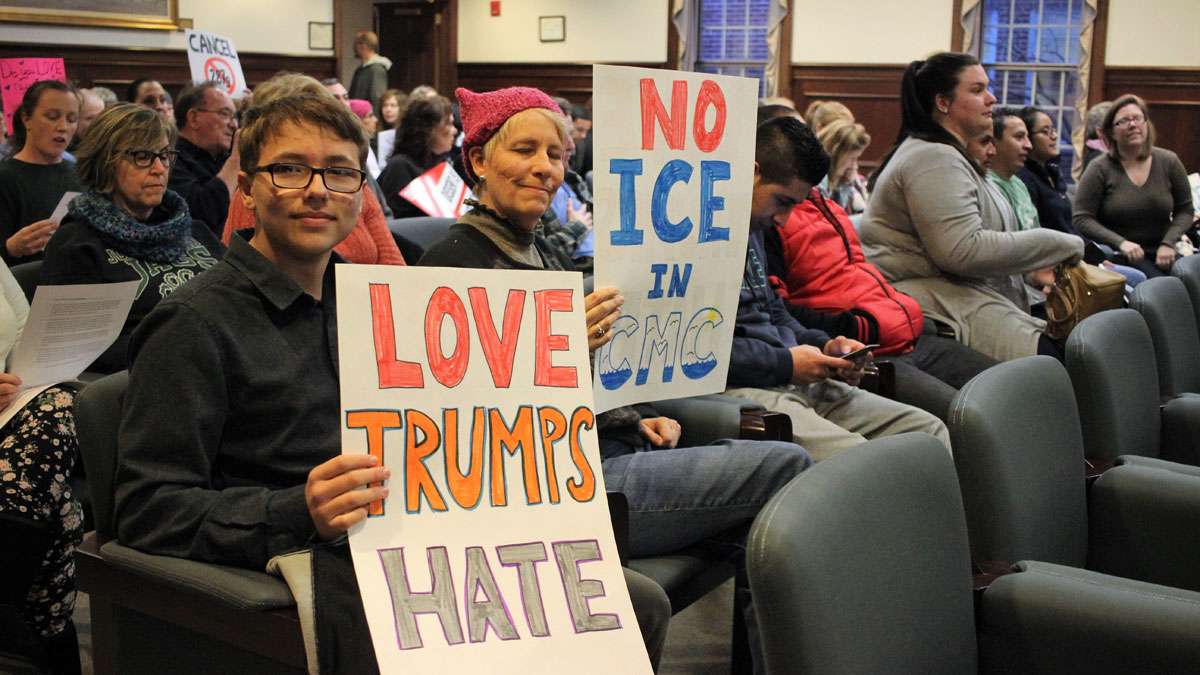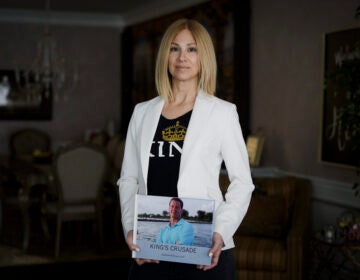National debate over immigration hits Cape May after sheriff’s department seeks ICE training
Critics of a plan to train some officers in the Cape May County sheriff’s department in immigration enforcement packed the meeting room of the Cape May County Board of Freeholders Tuesday evening, March 14.
The local debate unfolds while immigration is at the at the forefront of the national conversation. Since the meeting, two federal judges blocked federal limits to travel from several predominantly Muslim countries, included in a second executive order, signed by President Trump after courts blocked a previous order. Judge Derrick K. Watson, citing rhetoric from the campaign, wrote that an objective observer would see the latest order was issued to disfavor a particular religion, according to national media reports.
Although the local application was filed before the November election day, Trump’s election and the fraught language used on immigration clearly motivated several of the protestors.
The lengthy public comment portion of the meeting included one heated exchange, a running disagreement on terminology, and questions from members of the county’s governing body about what, exactly, would change under the proposal. Almost unnoticed was the approval of a $107 million county budget for the year, along with more than 30 other resolution votes, which all passed unanimously.
Instead, about 50 people held signs saying “Dissent is patriotic” and “Love trumps hate,” and speakers called on the board to keep local police out of immigration enforcement. Sandy Gatelein, who identified herself as a member of Cape May County Indivisible, opposed any connection between those enforcing criminal laws and immigration, saying it promoted fear, prevented immigrants from cooperating with police and made communities less safe. She said the county wanted to minimize the issue.
“You have to understand that this is bigger than just three officers in a jail,” she said. “This is part of a hateful agenda that comes from the top, and it’s got families scared to death.”
Last year, Sheriff Gary Schaffer applied to U.S. Immigration and Customs Enforcement for training for three officers in the county jail, which his department oversees. In previous interviews, Schaffer said one of the officers is experienced in investigation, another is fluent in Spanish, and the third a fluent Russian speaker. Referred to as 287(g), the program provides four weeks of training and access to ICE computers for the officers, who would then be able to enforce federal immigration rules under ICE supervision.
Schaffer is still waiting for word on whether or not the application will be accepted, and has said the officers will only operate inside the jail, meaning the department will only check the immigration status of those who have been charged and held in custody. What’s more, he stressed in a previous interview, his officers already look into immigration status with ICE as part of their routine background check, and have done so for more than a decade. In recent interviews, he’s suggested that it is the response to the proposal that has scared families, and assured residents that his officers have no intention of going out looking for immigrants at home or work.
But the issue has rallied some Cape May County residents, particularly those involved with several new organizations that have sprung up in response to the Trump presidency. At meetings and through social media, groups like Indivisible and others have organized against 287(g) in Cape May County.
The matter was not on the agenda Tuesday, and it’s not clear if the freeholders expect to vote on it at all. The sheriff has the authority to apply for the program on his own, and did so with very little fanfare. But the freeholders have public meetings, and so far that is where the opponents have made their stand.For about an hour and half, speakers criticized the proposal, and said immigrants in the county are frightened and feel under siege.
A woman from Cumberland County who gave her name only as Diana and described herself as a member of a Spanish speaking community, said when 287(g) comes to a community the number of deportations increases, even if it is only in the jail. That means divided families, and children born in the United States ending up in foster homes because their parents have been detained or deported she said. She told the freeholders that her neighbors and relatives fear a minor infraction could land them in jail, and then in front of an immigration hearing. For instance, her uncle can’t work if he doesn’t drive, but he can’t legally get a license. That means a traffic issue that would be inconsequential for a resident could have a devastating effect for him.
“What you have to understand is that families are already scared,” she said.Other speakers suggested workers would not come to Cape May County in the summer if they thought they could be deported, leaving businesses understaffed. They said numerous business rely on undocumented workers. Gerald Thornton, the freeholder director, questioned whether there were any undocumented workers in the county, because they would need a Social Security number to work. Speakers said many workers use false Social Security numbers, and in fact put billions of dollars in wage taxes into that program with no chance of seeing benefits.
Schaffer was not at the Tuesday meeting, and the sheriff does not routinely attend county government meetings. In previous interviews, he’s said that the only way anyone will be checked under the 287 (g) is if they end up in his jail, and that the only way that will happen is if they break the law. Freeholders at the Tuesday meeting suggested the issue was primarily a matter of perception, and that little will change in how the county enforces the law if the program is approved.
But Jeffrey Sutherland, an attorney who lives in Ocean City, said that perception matters a great deal. He said he has been approached by numerous families since the first stories about the 287 (g) plan appeared in local media, concerned about what will happen to their children if they are deported.
“The only thing that they’re doing here illegally is living here,” he said. He’s also heard from local businesses concerned about their employees, he said, issues that had not come up before in 27 years of practicing law in the area.
Immigration policy is often driven by fear, Sutherland said, citing previous bans on Chinese, Italian and Irish immigrants. He said some may see today’s situation as much different, but in the early 1900s, many in the United States feared Italian immigrants because of the Anarchist movement. He added that his great grandfather, Mahmood Medany, was an immigrant from Syria. He asked if the freeholders would see him differently now that they know he is Syrian? Or if he appeared before them with full beard and long robes?
Freeholder Will Morey said it might affect his perception, but that he would try very hard not to let it.
Morey, one of two freeholders up for reelection this year, tried several times to engage the speakers, describing the 287 (g) matter as an issue for discussion. He asked whether the county had any reputation as aggressive toward immigrants before the 287 (g) issue. Several of those attending said it did not.
Sutherland, who is also the county Democratic leader and was addressing the all-Republican county freeholders, said the issue goes beyond politics.
While most of the discussions were polite, there were a few heated moments, including an exchange between Thornton and Steven Fenichel, a dermatologist and Ocean City resident, early on in the meeting. In extensive comments, Fenichel had compared the county’s actions to Judas accepting 30 pieces of silver, the price the Gospels say he received for betraying Jesus Christ. He also suggested the enforcement would not stay in the jail.
“It’s a slippery slope. Once you let those ICE devils get their foot in the door, they’re going to start kicking it down,” he said.
“Doctor, we have been notifying ICE now for many, many years. We were doing this during the Obama administration,” Thornton said. “Nothing has changed.””Our whole country has changed,” responded Fenichel. He said it was wrong to begin with, but he didn’t know about it.
Thornton, who cited a relative by marriage who is an immigrant who has gone through the legal process and now was documented resident, irked many in attendance over how to refer to immigrants who are not documented.”I like to call them illegals, but you call them undocumented because you’re politically correct,” he said.
“You don’t know me at all, freeholder,” responded Fenichel.Much later in the meeting, Sonya Brertini, a teacher who works with Spanish speaking students and who has been active in the issue, told Thornton, “‘Illegal’ is not a noun. Do not use it as such, please.”
Resident Barbi Harris questioned what the county will get out of the program besides computers and a chance to save a call to ICE. Thornton said they’ll still have to make the call.
“What we get out of it is protecting the residents and citizens of Cape May County,” he said.
“We’re not buying that,” call out a member of the audience.
According to ICE, 287(g) dates from the “Illegal Immigration Reform and Immigrant Responsibility Act” of 1996. The section allows the director of ICE to enter agreements with state and local law enforcement agencies to allow designated officers to enforce immigration law, after training and under the supervision of ICE officers. The agency has 37 such agreements in 16 states, including three in New Jersey, all centered in county jails. Salem County recently joined Hudson County and Monmouth County in the program.
Thornton said the program is aimed at drug dealers and gang members, and denied racism or xenophobia played any part.
“This will make sure that they don’t get released back into the community to commit more crimes. It will make sure they get sent back where they came from,’ Thornton said. He said he wants to make sure everyone, citizens and illegals, receive due process if accused of a crime, and defended his use of the word as descriptive, whether or not it is a noun.
“There are illegal white people in the county,” he said.
Those attending the meeting said they will be back, and do not plan to drop the mater.
One of the last words at the meeting went to Joe Griffies, a veteran’s advocate who said he would not take a position for or against. But he said the country is divided, comparing it to the Civil War, and that division makes the nation weaker.”I was in Vietnam when 6-year-olds were carrying grenades, and when they came to this country we didn’t treat them as terrorists,” he said. He said the only thing right in the room was the American flag behind the freeholders. “The bad guys are coming, and if we are divided, they’re going to beat us.”
WHYY is your source for fact-based, in-depth journalism and information. As a nonprofit organization, we rely on financial support from readers like you. Please give today.








